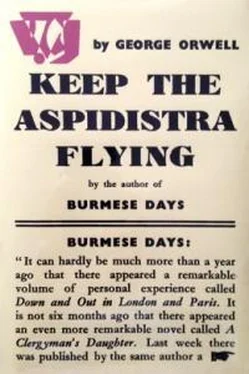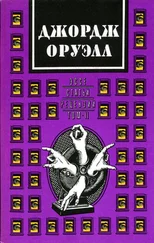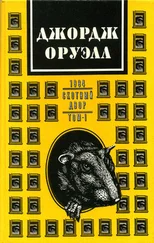He took up his pen again. It was a quite futile gesture. She hadn't written after all! The little beast! He had not the smallest intention of doing any more work. Indeed, he could not. The disappointment had taken all the heart out of him. Only five minutes ago his poem had still seemed to him a living thing; now he knew it unmistakably for the worthless tripe that it was. With a kind of nervous disgust he bundled the scattered sheets together, stacked them in an untidy heap, and dumped them on the other side of the table, under the aspidistra. He could not even bear to look at them any longer.
He got up. It was too early to go to bed; at least, he was not in the mood for it. He pined for a bit of amusement—something cheap and easy. A seat in the pictures, cigarettes, beer. Useless! No money to pay for any of them. He would read King Lear and forget this filthy century. Finally, however, it was The Adventures of Sherlock Holmes that he took from the mantelpiece. Sherlock Holmes was his favourite of all books, because he knew it by heart. The oil in the lamp was giving out and it was getting beastly cold. Gordon dragged the quilt from his bed, wrapped it round his legs, and sat down to read. His right elbow on the table, his hands under his coat to keep them warm, he read through 'The Adventure of the Speckled Band.' The little gas–mantle sighed above, the circular flame of the oil lamp burned low, a thin bracket of fire, giving out no more heat than a candle.
Down in Mrs Wisbeach's lair the clock struck half past ten. You could always hear it striking at night. Ping–ping, ping–ping—a note of doom! The ticking of the alarm clock on the mantelpiece became audible to Gordon again, bringing with it the consciousness of the sinister passage of time. He looked about him. Another evening wasted. Hours, days, years slipping by. Night after night, always the same. The lonely room, the womanless bed; dust, cigarette ash, the aspidistra leaves. And he was thirty, nearly. In sheer self–punishment he dragged forth a wad of London Pleasures, spread out the grimy sheets, and looked at them as one looks at a skull for a memento mori. London Pleasures, by Gordon Comstock, author of Mice. His magnum opus. The fruit (fruit, indeed!) of two years' work—that labyrinthine mess of words! And tonight's achievement—two lines crossed out; two lines backward instead of forward.
The lamp made a sound like a tiny hiccup and went out. With an effort Gordon stood up and flung the quilt back on to his bed. Better get to bed, perhaps, before it got any colder. He wandered over towards the bed. But wait. Work tomorrow. Wind the clock, set the alarm. Nothing accomplished, nothing done, has earned a night's repose.
It was some time before he could find the energy to undress. For a quarter of an hour, perhaps, he lay on the bed fully dressed, his hands under his head. There was a crack on the ceiling that resembled the map of Australia. Gordon contrived to work off his shoes and socks without sitting up. He held up one foot and looked at it. A smallish, delicate foot. Ineffectual, like his hands. Also, it was very dirty. It was nearly ten days since he had a bath. Becoming ashamed of the dirtiness of his feet, he sagged into a sitting position and undressed himself, throwing his clothes on to the floor. Then he turned out the gas and slid between the sheets, shuddering, for he was naked. He always slept naked. His last suit of pyjamas had gone west more than a year ago.
The clock downstairs struck eleven. As the first coldness of the sheets wore off, Gordon's mind went back to the poem he had begun that afternoon. He repeated in a whisper the single stanza that was finished:
Sharply the menacing wind sweeps over The bending poplars, newly bare, And dark ribbons of the chimneys Veer downward; flicked by whips of air, Torn posters flutter.
The octosyllables flicked to and fro. Click–click, click–click! The awful, mechanical emptiness of it appalled him. It was like some futile little machine ticking over. Rhyme to rhyme, click– click, click–click. Like the nodding of a clock–work doll. Poetry! The last futility. He lay awake, aware of his own futility, of his thirty years, of the blind alley into which he had led his life.
The clock struck twelve. Gordon had stretched his legs out straight. The bed had grown warm and comfortable. The upturned beam of a car, somewhere in the street parallel to Willowbed Road, penetrated the blind and threw into silhouette a leaf of the aspidistra, shaped like Agamemnon's sword.
'Gordon Comstock' was a pretty bloody name, but then Gordon came from a pretty bloody family. The 'Gordon' part of it was Scotch, of course. The prevalence of such names nowadays is merely a part of the Scotchification of England that has been going on these last fifty years. 'Gordon', 'Colin', 'Malcolm', 'Donald'—these are the gifts of Scotland to the world, along with golf, whisky, porridge, and the works of Barrie and Stevenson.
The Comstocks belonged to the most dismal of all classes, the middle–middle class, the landless gentry. In their miserable poverty they had not even the snobbish consolation of regarding themselves as an 'old' family fallen on evil days, for they were not an 'old' family at all, merely one of those families which rose on the wave of Victorian prosperity and then sank again faster than the wave itself. They had had at most fifty years of comparative wealth, corresponding with the lifetime of Gordon's grandfather, Samuel Comstock—Gran'pa Comstock, as Gordon was taught to call him, though the old man died four years before he was born.
Gran'pa Comstock was one of those people who even from the grave exert a powerful influence. In life he was a tough old scoundrel. He plundered the proletariat and the foreigner of fifty thousand pounds, he built himself a red brick mansion as durable as a pyramid, and he begot twelve children, of whom eleven survived. Finally he died quite suddenly, of a cerebral haemorrhage. In Kensal Green his children placed over him a monolith with the following inscription:
IN EVER LOVING MEMORY OF
SAMUEL EZEKIEL COMSTOCK,
A FAITHFUL HUSBAND, A TENDER FATHER AND
AN UPRIGHT AND GODLY MAN,
WHO WAS BORN ON 9 JULY 1828, AND
DEPARTED THIS LIFE 5 SEPTEMBER 1901,
THIS STONE IS ERECTED BY
HIS SORROWING CHILDREN.
HE SLEEPS IN THE ARMS OF JESUS.
No need to repeat the blasphemous comments which everyone who had known Gran'pa Comstock made on that last sentence. But it is worth pointing out that the chunk of granite on which it was inscribed weighed close on five tons and was quite certainly put there with the intention, though not the conscious intention, of making sure that Gran'pa Comstock shouldn't get up from underneath it. If you want to know what a dead man's relatives really think of him, a good rough test is the weight of his tombstone.
The Comstocks, as Gordon knew them, were a peculiarly dull, shabby, dead–alive, ineffectual family. They lacked vitality to an extent that was surprising. That was Gran'pa Comstock's doing, of course. By the time when he died all his children were grown up and some of them were middle–aged, and he had long ago succeeded in crushing out of them any spirit they might ever have possessed. He had lain upon them as a garden roller lies upon daisies, and there was no chance of their flattened personalities ever expanding again. One and all they turned out listless, gutless, unsuccessful sort of people. None of the boys had proper professions, because Gran'pa Comstock had been at the greatest pains to drive all of them into professions for which they were totally unsuited. Only one of them—John, Gordon's father—had even braved Gran'pa Comstock to the extent of getting married during the latter's lifetime. It was impossible to imagine any of them making any sort of mark in the world, or creating anything, or destroying anything, or being happy, or vividly unhappy, or fully alive, or even earning a decent income. They just drifted along in an atmosphere of semi–genteel failure. They were one of those depressing families, so common among the middle–middle classes, in which NOTHING EVER HAPPENS.
Читать дальше








